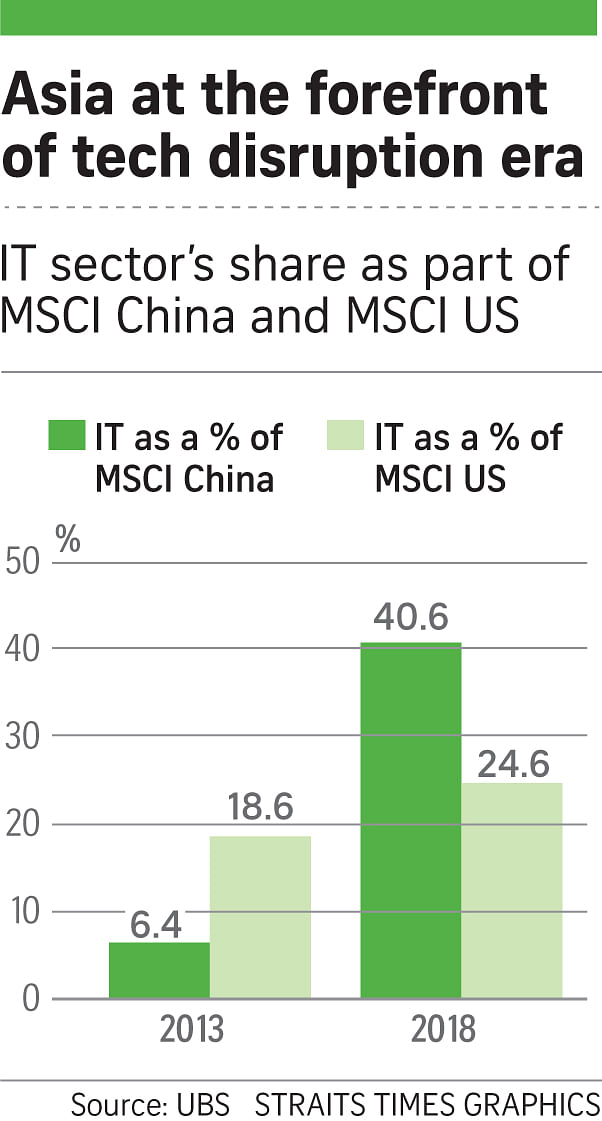I recently had the pleasure to co-chair a panel discussion at UBS' Wealth Insights event in Singapore. We covered a broad range of topics, from the macroeconomic outlook to Singapore's property market.
But one area in particular left a lasting impression: innovation and its impact on Singaporean society and investors' portfolios.
Taking a long perspective, the world's foray into technological innovation has only just begun.
Businesses are just starting to dabble in areas such as cloud computing, artificial intelligence, big data, the Internet of Things, and blockchain, and the results are having an outsized effect on both the market and society. Four out of the five largest United States stocks by market cap are tech firms (Apple, Microsoft, Amazon and Alphabet), and the sector has become the largest in the MSCI China and Emerging Market indices - this was not the case just three years ago.
People, meanwhile, have proven to be voracious consumers of all-things technology; the cryptocurrency boom and the rising popularity of connected devices are pertinent examples of the public's appetite for innovation.
The question is no longer about technology's influence on our lives - it's virtually omnipresent and will only continue to grow. Rather, it's a question of pace and which areas are next in line to be disrupted, and how investors should position themselves to profit from this transformation.
BEWARE THE IDES OF DISRUPTION
Industries, from retail to transportation, are increasingly being disrupted by new technologies and digital applications. This is creating a seismic shift in the balance of power of countries and capital markets, as innovative firms are swallowing market share from incumbents and thereby claiming a greater slice of the investment dollar.
This transition is occurring at perhaps the fastest rate in China, where the combination of a tech-savvy population and forward-thinking companies and government is producing fertile conditions for disruption to thrive.
For example, Tencent's WeChat is rapidly making cash obsolete in China and Alibaba's Taobao has turned the nation into avid e-commerce shoppers.
Meanwhile, thanks to favourable government policies such as Made in China 2025, China's manufacturing industry is rapidly upgrading its capacity to become a world leader in advanced electronics, medical technology, robotics, electric vehicles and autonomous driving.These trends are having a significant impact on the market. The share prices of Chinese tech firms and those riding the new-economy wave are trading at a premium, while investors are largely shunning traditional players at risk of disruption.

This favouritism has helped the tech-heavy MSCI China Index to outperform the financials-heavy CSI 300 Index in recent years.
And it's not just China experiencing such a shift - most of the region, especially Singapore, is pushing ahead to upgrade domestic innovation capabilities and facilitate the economic shift of old to new economy. Even as investors pontificate the longevity of the current economic expansion, which we believe has some length to go, there is no reason to expect this trend to end with the current business cycle.

In fact, we expect innovation to be Asia's next driving force of economic growth over the coming decade. So investors should prepare their portfolios accordingly, by investing in the disruptors and avoiding the disruptees - that is, technologically lagging companies in vulnerable industries including retail, manufacturing, telecoms, industrials and media.
SINGAPORE: WHAT'S NEXT?
Much of Singapore's economy and wealth creation is still heavily tied to the well-being of the local real estate sector. Despite its high lifestyle connectivity and tech literacy, the adoption rate of technology remains slow in Singapore.
A case in point is Singapore's mid-single-digit e-commerce penetration rate, which is below the global average (10 per cent) and far lower than China's (18 per cent), according to a Temasek study.
So how concerned should investors be about the risk of disruption to Singapore's economy? In my opinion, the greater risk has more to do with falling behind the technological curve than it is the potential near-term negative impact on businesses.
While the latter is significant and must be addressed, the potential rewards of leading the global race in innovation are tremendous.
Home-grown innovation creates a virtuous cycle, like what's happening in China today - attracting capital and talent spurs wealth, which in turn drives more investment and so on.
The good news is that Singapore is positioned favourably in terms of its capacity to innovate, particularly in areas such as artificial intelligence (AI) and smart mobility (electric vehicles, autonomous driving and car sharing). The city has become an attractive destination for global corporations and talent worldwide, as it ranks very high in global digital rankings and its universities offer specialised courses unique within Asia.
The Government, meanwhile, has committed to boosting the nation's technology sector through supportive policies such as Smart Nation and ai.SG, which allocates $150 million to various AI-related initiatives, and by earmarking certain regions for digital development. These positive supply-and-demand factors bode well for Singapore's future and are being recognised globally.
Singapore jumped to third in Bloomberg's recently published world rankings of the most innovative economies on the strength of its top ranking in the tertiary-efficiency category, which measures the share of new science and engineering graduates in the labour force, leaping ahead of most European economies and the US.
The tech sector just had a record year in 2017, and 2018 should be another good one for the sector globally. We are overweight on the US tech sector, as we expect earnings to grow by a low-to mid-teen rate in 2018, and like Asian Internet players for their structural growth.
The global software industry, in particular, should outperform the pack over the long term, with growth accelerating from rising IT spending and the increasing adoption of cloud services. The segment is also well placed for future expansion, given its position at the forefront of societal change.
•The writer is the Asia-Pacific regional head at the chief investment office of UBS Wealth Management.
